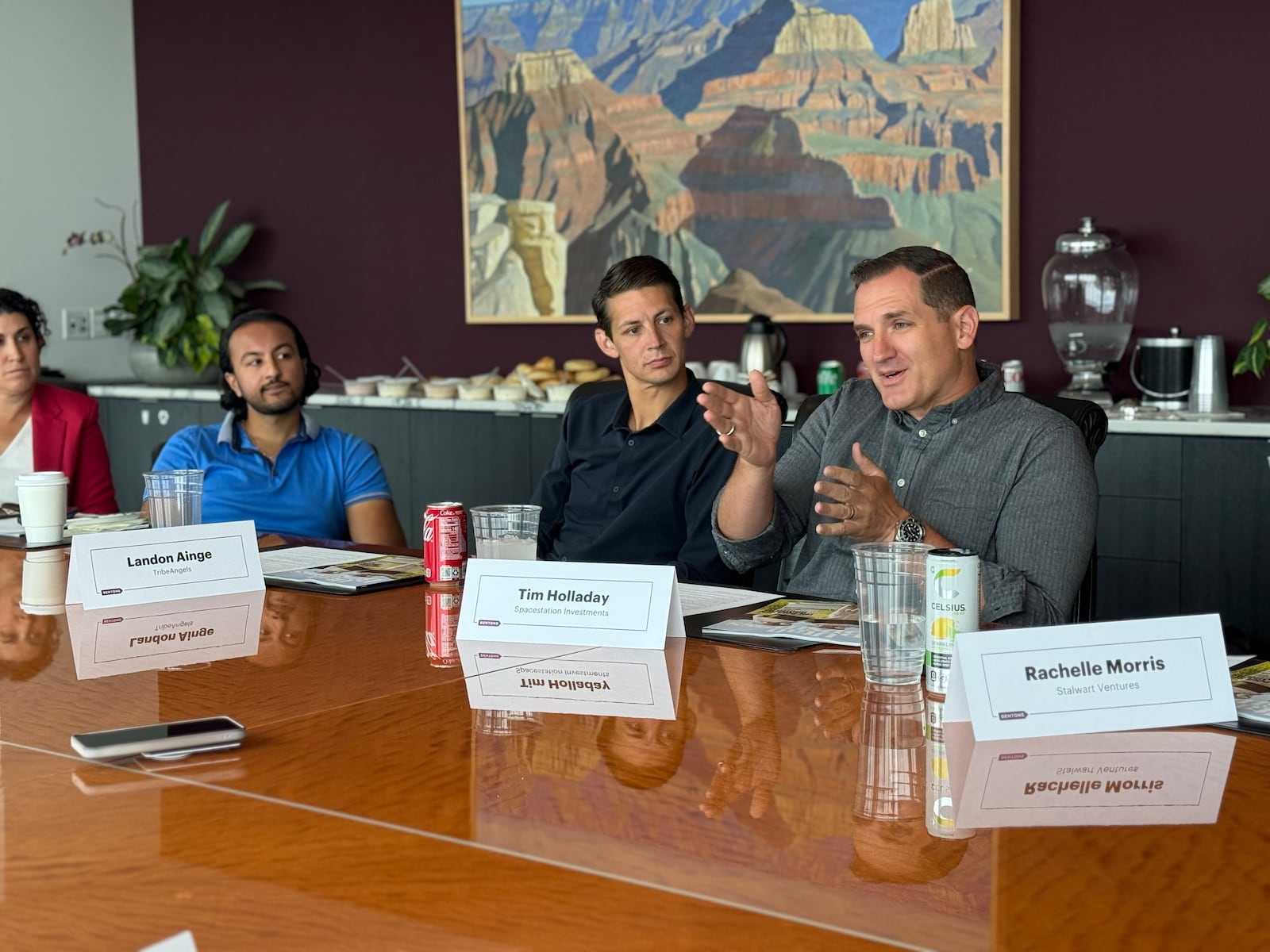This story appears in the August 2025 issue of Utah Business. Subscribe.
Last month, Utah Business partnered with Dentons Durham Jones Pinegar to host a roundtable on the current state of Utah’s venture capital. This conversation was moderated by Bubba Page, founder of Influence.vc.
What are some difficulties that both investors and founders are facing in the current environment?
Kapil Sharma | Director of Partner & Investor Relations | Altitude Lab
We were created by Recursion, a life science incubator, and we have our own pre-seed fund now. But most life science and healthcare companies, even digital health, stem from NIH [National Institutes of Health] and NSF [National Science Foundation] grant funding when they’re starting out. That was all paused at the beginning of the year. There were a lot of startups that were just, frankly, in limbo, including our own.
Landon Ainge | Founder & Managing Director | TribeAngels
It’s just a lot of people standing still because of liquidity, because of foreign policy, because of tariffs. … Generally speaking, that’s the reputation nationwide; it’s pretty normal. Institutions are favoring larger firms. … In times of uncertainty, it goes back toward proven commodities.
Jaymie Fung Bingham | VP | RET Ventures
I think in environments like today’s, the people who suffer are, unfortunately, emerging managers. … We’re seeing much more structured rounds even at early stages, which I think is a little scary because we’re losing some of the creativity in the early stages of VC. There’s not as much of that willingness to take a swing and miss because they know that LPs are so focused on performance right now.
Lenore Karafa | Co-Founder & Partner | UA1
I’m operating in one of the “brighter spots” of venture capital right now, which is defense tech. As the world becomes a more complex and dangerous place, there is money flowing into this space in particular. … There’s a whole ecosystem of innovators out there that literally have to innovate or die. We are definitely willing to make bets on those types of innovators.
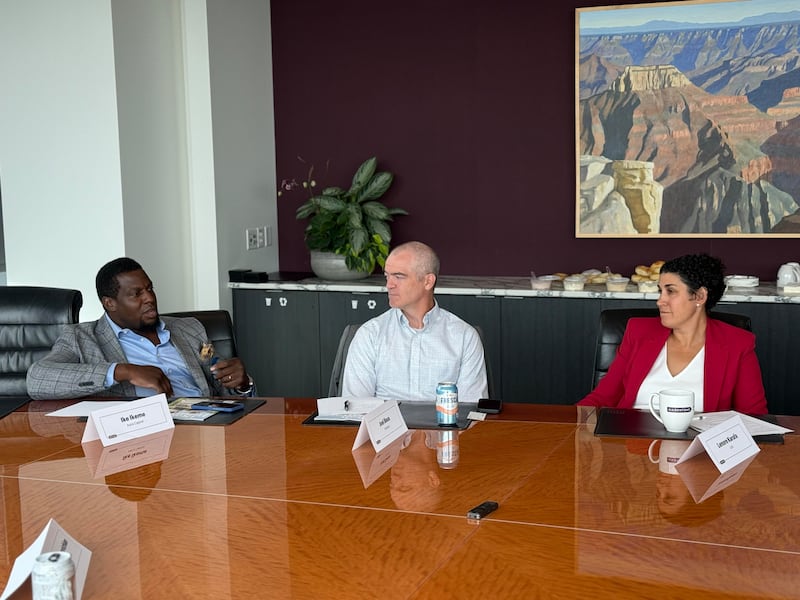
Rob Rueckert | Partner | Sorenson Capital
In the software space, there’s “not AI” and then the rest. … AI is in every piece of software. And if it’s not, you’re irrelevant. Everything that’s antiquated, anything that was a prior version — “not AI” — is being disrupted by an AI version. Utah is known for doing a lot of SaaS investments. I don’t think that’s going to change. It’s just going to be AI SaaS that is going to be built up around here.
Nick Efstratis | Co-Founder & Managing Director | Epic Ventures
In one way, I understand the fear and the concern that there’s no liquidity, that people are having a hard time raising funds. … I do feel for you guys just trying to get out of the gate, but you’ll get there; I know you will. I think the opportunity here is immense across a multitude of sectors. … We need to dig deeper, we need to go to our universities, we need to start partnering with industry more deliberately.
Joel Beus | Attorney | Dentons Durham Jones Pinegar
What I hear is that there’s a lot of trepidation for [startup founders]. Sometimes they’re nervous that VC money is great, but once we bring in a VC, they’re going to be domineering; they’re going to have this interest in hypergrowth and a quick exit, whereas our own internal strategy among the founders is to grow for a long time.
How does the Utah market differ from other states in our country?
Ike Ikeme | Founder & Managing Partner | Astra Capital
Utah is different, and that’s what is in style. Investment classes are all about taking a bet on something else. That’s what we are, something else. … I don’t think that we should play in our own different pockets. We should get together and then stand together as a state and say, “This is Utah. This is what we do,” and show our VCs, our universities, our state sector, all supporting and driving this ecosystem.
Jaymie Fung Bingham | VP | RET Ventures
Talking about Utah’s strengths and weaknesses, Utah still has a really big gender gap as it relates to the entire VC ecosystem. … When you look at the VC decision-makers at VC firms in Utah, it’s a very, very small percentage of women. … I think this takes a lot of time, I think it takes a lot of education at the earlier levels, getting young women and minorities excited about careers in finance. … I think Utah has improved a lot in the last 10 years, but there’s still room to go.
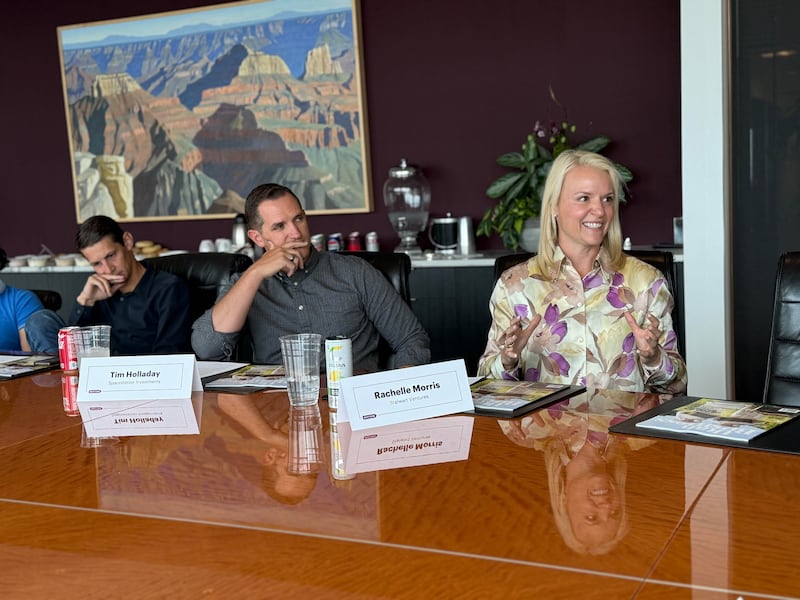
What advice would you give a founder on how to get in front of a VC and raise capital?
Ike Ikeme | Founder & Managing Partner | Astra Capital
I don’t think we do a very good job of approaching or being approachable. That’s just the honest truth. We’re snobbish, and that’s terrible. We should be more friendly and inviting to people to pitch, because we’re missing opportunities for our investors to find great deals and great talent if we’re not in the field and we’re not talking to them.
Rachelle Morris | Managing Director | Stalwart Ventures
As an investor, within the first five to 10 minutes in a conversation with an entrepreneur, I can discern whether or not they have spent more time thinking about a problem than thinking about the solution that they’re pitching me. … I want a founder who knows their industry so well that they are so aggravated by a problem that exists.
Tim Holladay | Managing Partner | Spacestation Investments
I built and bombed a couple companies back in the day, … [and] I remember thinking, “If I ever was on the other side of the table as an investor, I would answer every call, answer every text, at least just respond.” We looked at 1,200 companies in 2024. That’s 100 a month; that’s a dozen a day. I now realize that it’s just not practical to be able to respond and give a sit-down with every founder that approaches. So, to a founder, I would say you have to get into the ecosystem; … I don’t think there’s any magic to it. It’s just a grind.
Are universities responsible for teaching upcoming VCs and founders, or should it be us putting out courses?
Cory Cozzens | Co-Founder & Studio Managing Partner | Philo Ventures
I don’t think universities have a responsibility, but they certainly have an opportunity. I think universities historically have taken a very academic approach. I’m going to put a bit of a plugin for the Sandbox program that’s now at Brigham Young University, Utah Tech University, Utah Valley University, Utah State University, Boise State University and others now. … [There is] an incredible shift from that academic approach that doesn’t quite teach them what they need to know to be able to survive beyond that class that they’re taking, to really understanding the grind and what it takes to make it happen.
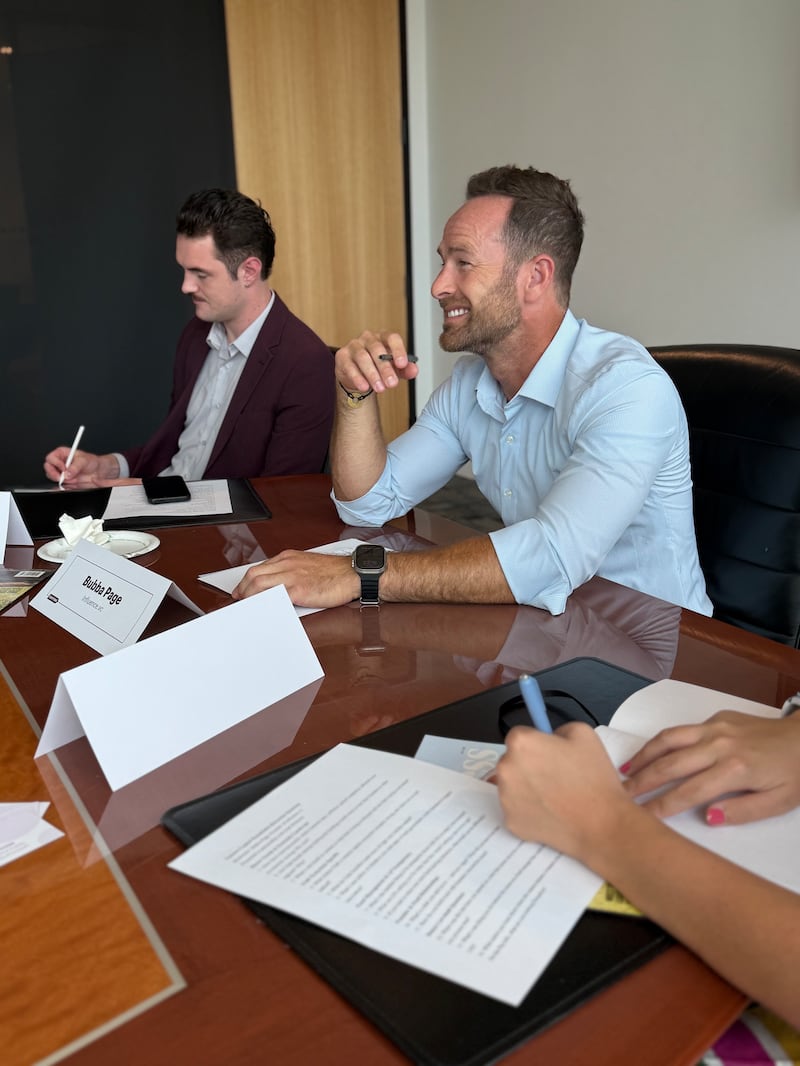
Kapil Sharma | Director of Partner & Investor Relations | Altitude Labs
These universities are doing a phenomenal job at creating entrepreneurial spirit and things within their respective student populations and faculty. … I think universities are very focused internally; they’re trying to do a little bit more industry, but I think there’s an opportunity for us as an industry to tie in from the other end and try and bridge out a little bit better.
What should a founder know as they enter the VC world?
Tim Holladay | Managing Partner | Spacestation Investments
At the end of the day, for a founder, it’s just all about extreme ownership. Capital is not going to just magically fix or solve your business. You have to build this thing, and even after you take in capital, it’s 100 percent on you. You’re still in the driver’s seat. … It’s a partnership, but I’ve sensed in some cases — not all — that founders think that we’re going to come in and save the day, like the white knight coming in.
PT Ungvichian | Partner | Signal Peak Ventures
Being upfront and being transparent is super valuable to me. … When push comes to shove, I want to make sure, especially at the very beginning, they can be partners with us. Inevitably, … there’s going to be bumps in the road. When those occur, you want to be able to develop a partnership. There’s no faster way to break a partnership than starting with lies or hidden truths or half-truths.
Rachelle Morris | Managing Director | Stalwart Ventures
Utah is the number one state for entrepreneurship … [partly] because of how accessible successful entrepreneurs are to emerging entrepreneurs. Some advice that I would give to a founder who is raising venture capital for the first time is that establishing a board of directors is to develop mentorship relationships with entrepreneurs.
Rob Rueckert | Partner | Sorenson Capital
Building a business is really, really hard, and the hardest part is that you have to listen to your customer. You have to change, and you have to adapt, and you have to fill their needs better than the hordes of other people that are trying to fill that need. And if you lose sight of that, … you lose sight of how big a company you can become. I find that’s where companies mostly fail — they stop listening.
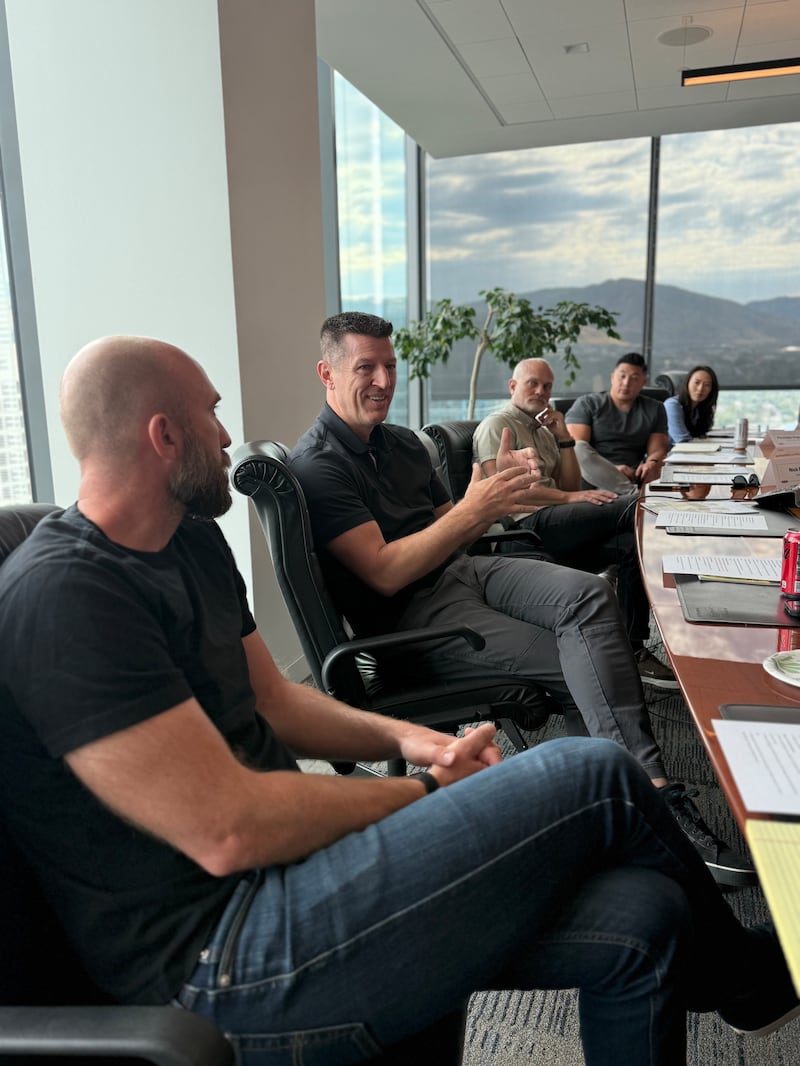
Nick Efstratis | Co-Founder & Managing Director | Epic Ventures
One thing I absolutely hate is swag. I get that you have to make your employees feel like they’re part of a family. Make T-shirts; give everybody a hat inside the company. Do not send any of that to a venture capitalist. … That’s my attitude. Also, office space. Just get the ugliest office you could possibly have. … I went in and one founder I decided to back, … he’d already sold a company, made some money, and I went up to his office. His first customers were Google, Meta and Apple. They were buying his product and he had the worst office. I was worried the roof was going to cave in. And I was like, “I’m giving this guy money because this guy knows how to build a business.”
Lenore Karafa | Co-Founder & Partner | UA1
Bringing in the right team and focusing on growing in the right ways by bringing on board the right people. I don’t think that can be underestimated. … I enjoy mentoring folks on how to scale their own leadership, and I’m more than happy to build that trusted relationship with a founder to help them scale their leadership so they can grow with their companies.
Cory Cozzens | Co-founder & Studio Managing Partner | Philo Ventures
One of the challenges of the “beehive” nature of Utah and the lack of a broader informal, sophisticated ecosystem is that you do still have a lot of, “My uncle’s an attorney, my brother’s going to help me build this.” As opposed to Silicon Valley, you go to the right attorney and you know the right guys to hire. … Go find the right person. Go find the right attorney. Go find the right engineer — which is, more often than not, probably not your uncle or your brother.
When do you know it’s not the right time to raise VC?
PT Ungvichian | Partner | Signal Peak Ventures
I think one of the things is the founder’s attention. For example, I was talking to a founder … and I started to prod about what’s important to him, [which] was being home at five and the three weeks a year that he can take off at any given time. The truth of the matter is, … he wants a lifestyle, but he wants the clout of being an entrepreneur who has raised capital. And sometimes those two identities don’t fully converge.
Landon Ainge | Founder & Managing Director | TribeAngels
It’s OK to not raise VC. Maybe just put that out there. Most great companies should not; just the ones that really want to take over a whole industry or disrupt a whole industry.

